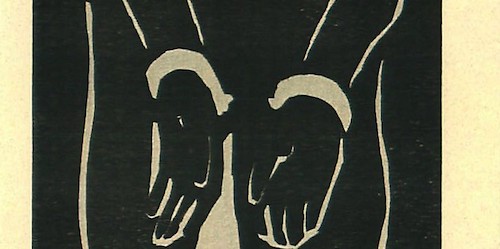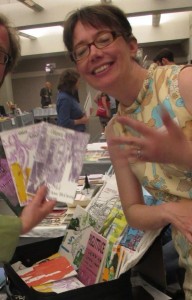on the small press, part four: 'more for others'
The fourth in a series of posts featuring editors and publishers discussing their projects. Today: Sammy Greenspan and Karen Randall.

Sammy Greenspan
I started the press for myself, lusting for some kind of writing-related work that could do some good, but I continue it more for others, the writers I have the privilege of working with and supporting, especially the ones with whom I’ve had close editorial working relationships. This was what surprised me the most: that I love that anachronistic editorial repartee, and so even though it makes little sense economically, I choose such projects from time to time, manuscripts that are not ready for prime time but that somehow grab me by the heart and the imagination. It’s the fairy tale version of editor as midwife.
One of the wompus chaps closest to my heart is Randall Horton’s Roxbury memoir excerpt, which we’ve sent into prison writing programs and to individual prisoners, along with college classrooms. Our diverse backlist includes Brinson & Shipman’s Super Poems, a book of startlingly literary poems about Super Mario Brothers; Leah Umansky’s Don Dreams and I Dream with its finger on the pulse of pop culture and gender politics; Sandra Robinson’s Ebonics, a series of prose poems in the form of traditional dances that she uses to articulate the real stuff of race in this country. My favorite off-center project is Cornelius Eady’s 2013 Book of Hooks, our first publication of music and writing together, which kicks off what will be, gods willing, a series of CDs from Cornelius and his band, Rough Magic.


Business realities: Kattywompus Press is economically marginal, still plowing everything back into the next project. Most of our books are chaps, without a spine and without the physical sturdiness to withstand sending back and forth to distributors and warehouses. Most of our books sell the old-fashioned way, through author contact, readings.
Everything else boils down to motive, doesn’t it? When I was about to start the press it was still [barely] possible to make a living publishing chapbooks if you were frugal, very clever, a bit ruthless. One of my mentors ran an indie small press for 30 years. For about ten years, toward the end of that run, it fully supported the publisher, including paying for some part time help. The press never had any government or grant funding, it had occasional small-time benefactors but most of the income came straight out of chapbooks, via a ferocious work ethic and a phenomenal through-put time for new publications, along with an extremely careful eye for how to spend time. This publisher
almost never worked in a close editorial relationship to coax a book along--though there were other significant community contributions.
My press has never brought in that kind of money. The period when I saw that happening was probably mid- to late-nineties, through to the economic downturn a few years back. It was that downturn which pulled the rug out from under a lot of the bulk sales of chapbooks (and that was right around the time I started the wompus). The larger orders for classroom use dried up in a wave of college budget cut-backs, even as publishing accelerated its digital diversification and fragmentation. Our Wal-mart, amazon economy demands cheap and we have never in this country much respected the value of an artist’s work. One of our authors referred to poetry as “basically a gift economy”—a point of view I would argue is self-destructive, in a time when academic positions are drying up and writers more than ever must find day jobs to support their writing.
For me running an independent literary small press is like making art: you follow your passions, obsessions, instincts, throw it out there and hope some of it will be useful to somebody. Being a political beast, that perspective informs my interests and choices, and I must have in the press a plethora of diverse authors; and always I keep ear to ground for original and innovative voices; and in the tradition of chapbook publishing, bring to print worthy community poets who represent unheard corners of the world. It also merits mention that we at the wompus love genre-busters and -blenders.
I don’t believe the doom-criers who toll the end of the print book. This is a time of intense and rapid cultural evolution, a time of critical social developments. Writing, in all its traditional and new forms, has never been more relevant, more pliant, more necessary—and small presses continue to provide an essential and vibrant doorway for writers and for readers.
***

Karen Randall
I began Propolis Press in 2001, just after 9/11 actually & I suppose that is significant: the desire to add beauty to the world in response to a heightened awareness of our human fragility. I was then working for another fine press (although I think of my own work as less fine press than artisanal), which (like most fine presses) was reprinting texts by long dead white men. I’m rather keen on contemporary poetry—particularly that being produced by women. This is actually less of a feminist impulse than the fact that I think that the best work being produced today is by women; and as much as I have enjoyed the poetry of long dead white men, do we really need to reprint it? And I have a particular aesthetic (both with regard to design and content); a vision, if you will, of beautifully printed, well-designed books that add to the pleasure of reading. Good design can make a challenging text easier to read. So, I felt there was real need. And there still is: for beautifully designed books of fabulous, contemporary poetry.
I like my smallness as a publisher; it allows me to be true to my own aesthetic. On some level, it is a form of potlatch. If I wanted to or had to live differently, I suppose I would. But I have chosen this path & will stick with it as long as I have the energy & the means to do so. It doesn’t bother me that some bookstores won’t carry my work; why should it? I have artist’s books in the special collections of many libraries, which is its own privileged niche.
The impulse to start the Least Weasel series came about because I wanted broader distribution for my poets, that I don’t really have with the limited edition high end publications. On the one hand, since many bookstores and certain small press distributors can’t deal with chaps—it does close a few doors. But on the other, I think my sensibility as an artist/ designer gives them a certain je ne sais quoi—so my chaps might appeal to someone who doesn’t ordinarily read poetry. I’ve certainly had people stand at my table reading….it is one of the pleasures of going to a book fair, to see people who are not necessarily poetry readers get seduced. (I’m attaching the blurb / course description I wrote a few years ago for a chapbook workshop, which speaks to some of this.)
I’m committed to remaining open with regard to form and content. With the caveat that I’m already pre-selecting / inviting poets who’ve previously written engaged texts. For example, I knew Susan Lander’s work though 248 msg.,a panic picnic which is a series of very tight text-sound-ish tercets, but I was absolutely thrilled to receive and publish 15: A Poetic Engagement with the Chicago Manual of Style. Of course, Sue is brilliant (as are all my least weasels) and I can’t wait for her Franklinstein project. In terms of community, I suppose I am by inclination connected with Naropa and the Poetry Project… but I think these are very open communities. Least Weasel Chapbooks are for anyone who is literate. One’s audience should always be expanding. I wouldn’t imagine any of my poets thinking that they were only meant to be read by certain people.
I’m very much opposed to contests, for my own press; other publishers can do what they want / need to, but I try to be very careful in soliciting work from poets that I want to publish. Having participated in reading manuscripts for a contest for a non-profit press, I would say that that experience—the experience of reading dozens upon dozens of manuscripts in one sitting is itself blunting. I remember thinking: how is it possible that so many poets feel compelled to write about Plato’s cave? By the nature of them, there is too much rejection involved in contests; I think it is mainly destructive & too ego-laden. Poetry doesn’t need that. So, I’d rather fund my publications by other means.
I’m still figuring out the economics of productions and distribution. It is quite expensive initially to buy the cover paper, the polymer plates, and have the text pages printed. Sometimes it seems like my high end work is paying for the chaps. Or that the other work I do (teaching, design work) is. Running a press like this is a bit like being a snake swallowing a very large rat—once you start eating, you cannot back off. Must keep eating, swallowing, moving forward. Maybe digestion will occur? Eventually?
I’m not sure if the landscape or my perception of it has changed more; I tend to think the latter, but maybe there is more of an awareness of the chapbook as a form; the CUNY Chapbook Festival seemed to have started roughly about the same time as I started publishing chaps. I get out to more readings as a result of my publishing more and wanting to keep up on what is out there. It’s one of the many things that I love about being a publisher, that it provides the excuse for hanging with poets and going to readings. I’ve been asked on several occasions by people outside our realm if I feel in competition with other publishers! Which always makes me laugh. I love other publishers—I cannot on my own provide a venue for every poet that I love—and it’s important that all of us work together to promote each other.
I think this is a very exciting time for poetry—technology, both new and old, is at our disposal. There is all the retro-joy to be had in letterpress printing as well as computer-mediated work: vispo, video, interactive hypertexts, poetry apps, etc. But ultimately it’s really about human interaction. Poetry is. It can be a quiet verbal exchange in a private reading or a raucous, full-bodied, multi-glossal performance. That hasn’t changed.
Course description for a letterpress intensive taught at The Center for Book Arts:
Before there was Facebook, there was the CHAPBOOK.
THE CHAPBOOK & THE BROADSIDE: letterpress intensive for poets
Before there was Facebook, there was the CHAPBOOK. (Take that, Zuckerberg! just try to sue me for copyright infringement!) And before the chapbook, there was the BROADSIDE—those single printed sheets circulated for a half-penny by peddlers known as chapmen. (A broadside folded twice thus came to be called a chapbook.)
Because Chapbooks and Broadsides are quick and inexpensive to produce, they are a great medium for experimentation & personal expression. And unlike blogs (which are also quick and inexpensive to produce), you can hold them in your hand, caress them, read them on an airplane, hand them out to random strangers on street corners, take them in the bathtub, sleep with them under your pillow, scent them with perfume, and let your cat or dog chew them into little bits.
So why letterpress? In this of post-industrial age of plastic and virtual realities, we all crave the pleasures of the tactile/ the real. What is more satisfying to touch and to look at than a gorgeous inked impression on a zaftig sheet of paper? You know this to be true, what are you waiting for?
In this weekend workshop, you will:
become familiar with the California job case
hand set metal type in a composing stick
lock up a form of type
play with wood type
get your hands dirty
print a run of covers for a chapbook
print a run of your broadside
learn something about the history of design
meet other poets and have lots of fun
Stephanie Young lives in Oakland, California. Her collections of poetry include Telling the Future Off...
Read Full Biography

